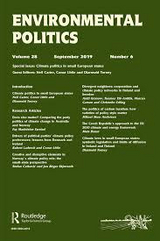
Environmental provisions in trade agreements: defending regulatory space or pursuing offensive interests?
Blümer, Dominique / Jean-Frédéric Morin / Clara Brandi / Axel BergerExternal Publications (2019)
in: Environmental Politics 29(5), 866-889
DOI: https://doi.org/10.1080/09644016.2019.1703383
Information
The increasing uptake of environmental provisions in preferential trade agreements (PTAs) is well documented, but little is known about why countries prefer certain types of provisions over others. Exploiting a fine-grained dataset on environmental provisions in PTAs, we hypothesize that environmental provisions are more likely to be adopted when they aim at preserving countries’ regulatory sovereignty. We find that the likelihood of adoption is indeed higher for defensive provisions, but this likelihood decreases if there is a large variation in PTA members’ stringency of environmental regulations, and in particular, for PTAs with asymmetric power relationships. While countries first and foremost attempt to preserve their regulatory sovereignty when adopting environmental provisions, countries with stringent environmental regulations and strong bargaining power vis-à-vis their trading partners also try to level the playing field and pursue more offensive interests.


